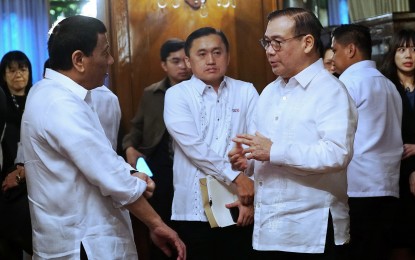
President Rodrigo R. Duterte and Foreign Affairs Secretary Teodoro Locsin, Jr. (Presidential Photo)
MANILA -- The Philippine government, through the Department of Foreign Affairs (DFA), hit the United Nations-adopted resolution seeking for a comprehensive written report on the human rights situation in the country, describing its validity as "questionable".
The Iceland-initiated resolution was adopted with 18 votes in favor, 14 against, and 15 abstentions by the UN Human Rights Council (UNHRC) on Thursday night.
"This resolution was not universally adopted. Therefore, its validity is highly questionable. It does not represent the will of the Council, much less that of the developing countries who are always the target of such resolutions," Foreign Affairs Secretary Teodoro Locsin, Jr. said in a statement.
"Western countries pushed for this resolution in the confidence that the world has forgotten what they did and what should have been done to them had there been a Human Rights Council. It was pushed with the arrogance that developing countries must not stand up to them even if we can and as we hereby do. There will be consequences," he warned.
Locsin described as politically partisan and one-sided the Iceland resolution, reiterating Manila's position to reject it.
"It cannot, in good conscience, abide by it. We will not accept a politically partisan and one-sided resolution, so detached from the truth on the ground. It comes straight from the mouth of the Queen in Alice in Wonderland, 'First the judgment, then the proof'," he said.
Among the 18 states that voted yes include Argentina, Australia, Austria, Bahamas, Bulgaria, Croatia, Czech Republic, Denmark, Fiji, Iceland, Italy, Mexico, Peru, Slovakia, Spain, Ukraine, United Kingdom including Northern Ireland, and Uruguay.
Fourteen nations, on the other hand, voted no, including Angola, Bahrain, Cameroon, Hungary, China, Cuba, Egypt, Eritrea, India, Iraq, Qatar, Saudi Arabia, and Somalia.
Meanwhile, fifteen abstained, including Japan, South Africa, Brazil, and Pakistan.
But despite the resolution's adoption, Locsin said the country will continue to work with the UNHRC, as the Philippines "must remain true to the cause of human rights."
"The Philippines renews its solemn responsibility to protect the law-abiding against the lawless by any means efficient to achieve the defining purpose for the existence and expense of a state. To that responsibility, my President has made an iron, unwavering and total commitment; and it will not be weakened by this ill-fated resolution," he said.
He also acknowledged those who voted against the said resolution.
"We renew our solidarity with our true friends who have stood by us in this farce. But we will not tolerate any form of disrespect or acts of bad faith. There will be consequences; far-reaching ones," he said.
State's responsibility
In defending the country's campaign against illegal drugs, Locsin said the state's "responsibility to protect starts with protecting the good against the bad, the innocent against the vicious".
"We invoke the government’s great power – and therefore commensurate responsibility – to protect human rights as multilateral bodies cannot. Foremost among those rights is the right to be protected from crime by the state," he said.
He also called out Western nations for bringing Manila "down to the level of the authors of atrocities the world must not forget", citing the Amritsar massacre, Mau Mau Revolt, the Boer War and the trendsetting holocaust of the Congo among others.
"But we will not engage in throwing at each other the bodies of each side’s respective victims. We cannot compete with the West," he said.
"The Philippines is affronted that we should be named with the very breath of these authors of these atrocities, the same ones so bold to condemn us – we who opened our arms to save their victims before the War, and well into the savage wars of peace culminating in the Vietnam War to whose victims we gave shelter when everyone else turned them away," he said. (PNA)
